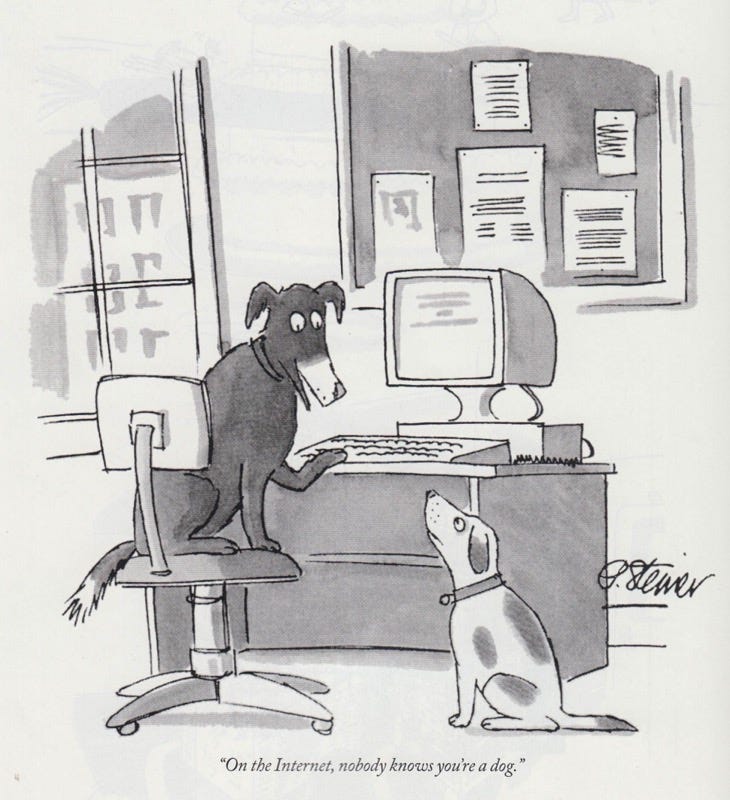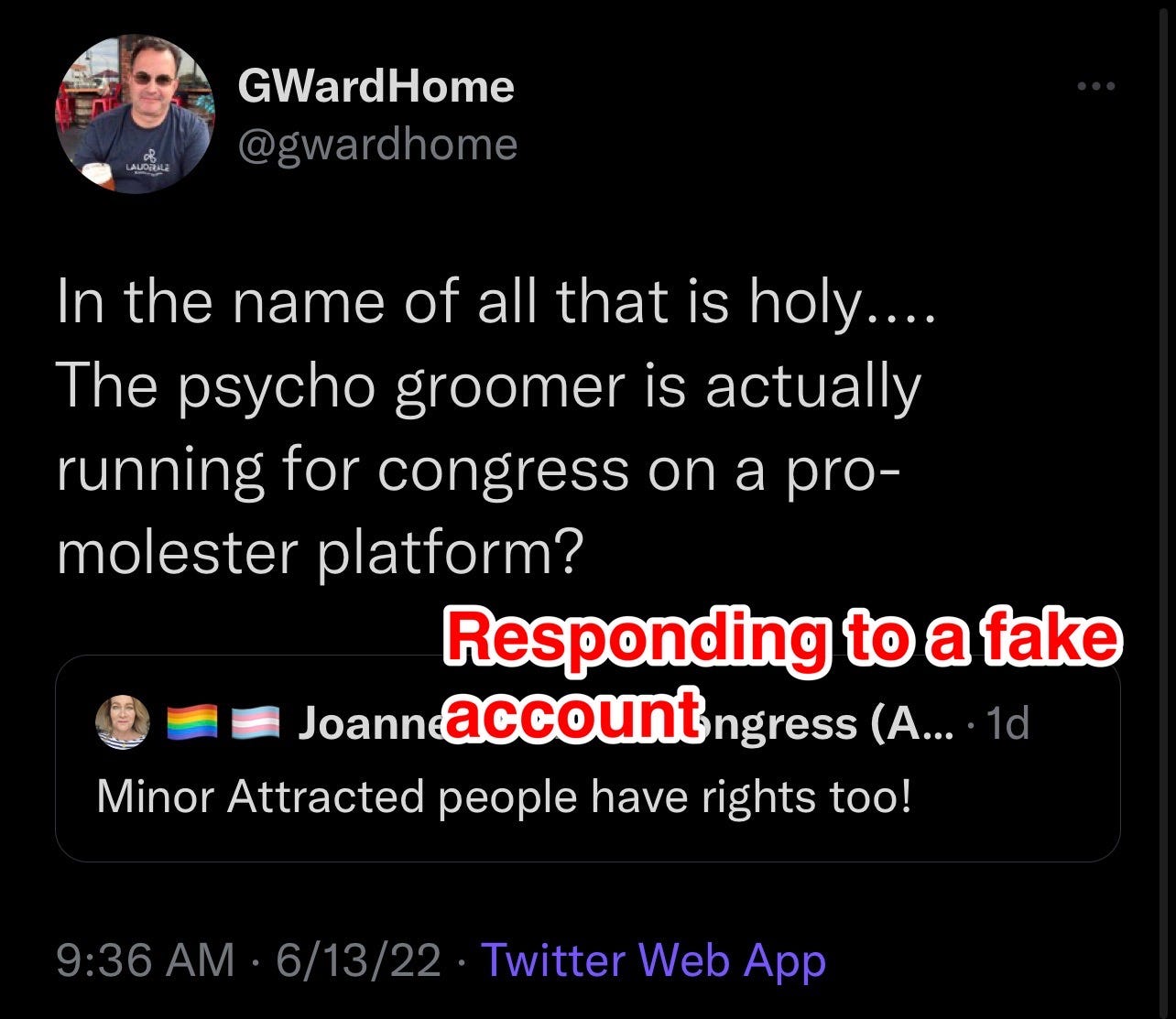On the internet, nobody knows you're a dog
Anonymity is good, but we have to be vigilant about bad actors exploiting it for the purpose of making groups look bad.
Back in 2014, right-wing trolls on 4chan came up with an idea: #EndFathersDay
To be clear, they didn’t actually want to “end” Father’s Day. Rather, they wanted people to think that feminists wanted to “end” Father’s Day. Their plan was simple: create a bunch of fake, feminist-looking Twitter accounts, flood the internet with tweets calling for the abolition of Father’s Day while using the hashtag #EndFathersDay, and then sit back and wait to see what would happen.
![4Chan post: “Almost all cases of domestic violence, domestic rape, child abuse, adultery, and discontent in the home are caused by men, i.e. fathers. A holiday that celebrates this is another symptom of the disease known as patriarchy, and has no place in a progressive society. This is a holiday celebrating misogyny, demanding appreciation and gifts for doing what a father should be doing anyway, especially when almost all cases of domestic abuse stem from the father. Fathers all over the country are refusing to pay alimony or child support, which should not [be] celebrated and rewarded, but should be shamed. ‘Father’s Day’ should not be about celebrating the role of a father in the family, but about correcting it. It shouldn’t be celebrated in its present form. We are calling on all feminists and social justice warriors to join us in a campaign to redefine this disgustingly misogynist holiday. #EndFathersDay in its entirety. We will be descending upon Twitter and Tumblr to get the message out that this patriarchal ‘holiday’ has no place in our society.” 4Chan post: “Almost all cases of domestic violence, domestic rape, child abuse, adultery, and discontent in the home are caused by men, i.e. fathers. A holiday that celebrates this is another symptom of the disease known as patriarchy, and has no place in a progressive society. This is a holiday celebrating misogyny, demanding appreciation and gifts for doing what a father should be doing anyway, especially when almost all cases of domestic abuse stem from the father. Fathers all over the country are refusing to pay alimony or child support, which should not [be] celebrated and rewarded, but should be shamed. ‘Father’s Day’ should not be about celebrating the role of a father in the family, but about correcting it. It shouldn’t be celebrated in its present form. We are calling on all feminists and social justice warriors to join us in a campaign to redefine this disgustingly misogynist holiday. #EndFathersDay in its entirety. We will be descending upon Twitter and Tumblr to get the message out that this patriarchal ‘holiday’ has no place in our society.”](https://substackcdn.com/image/fetch/$s_!98Bc!,w_1456,c_limit,f_auto,q_auto:good,fl_progressive:steep/https%3A%2F%2Fbucketeer-e05bbc84-baa3-437e-9518-adb32be77984.s3.amazonaws.com%2Fpublic%2Fimages%2Ff6e9f287-4f0e-4dcd-a38b-baf91b2d9171_1221x483.jpeg)
Father’s Day rolled around and “#EndFathersDay” trended on Twitter.
One of the campaign’s goals was to see how many actual feminists would hop aboard the #EndFathersDay campaign, despite seeing just how ridiculous it was. While a few people almost certainly did that, the vast majority of the tweets came from the trolls themselves or from right-wing Twitter accounts who weren’t in on the joke but were eager to attack the left. For instance:
Fox News dedicated an entire segment to the hashtag on its Sunday edition of Fox & Friends that year.
“It started out as a joke, but the hashtag #EndFathersDay is picking up steam with feminists online and with others on social media,” co-host Tucker Carlson said at the beginning of the segment. (No, it was not “picking up steam with feminists,” and adding “started out as a joke” was simply a way to acknowledge that it was a hoax while still running the same “feminists these days!” story days after it had already been debunked. This is the same exact strategy they roll out for everything from “the left is canceling Dr. Seuss!” to “Mr. Potato Head is going gender-neutral!?!?!”)
If you’re unfamiliar with the strategy, there are some really good pieces about the hashtag and how this happened: In 2014, Ryan Broderick wrote a story for BuzzFeed with a step-by-step debunking of it. In 2019, Rachelle Hampton wrote a story for Slate about Shafiqah Hudson and I’Nasah Crockett’s push to expose the hoax with the #YourSlipIsShowing hashtag. Reading both stories will help you understand this particular moment in politics.
That brings us to my message today: please stop believing everything you see on the internet.
The same exact strategy that got people angry at Black feminists is now being deployed on all sorts of targets, and it’s been frustratingly successful.
“On the Internet, nobody knows you’re a dog,” is a joke nearly as old as home internet use itself (1993!), and remains as relevant now as it was then. Anonymity on the internet gives people the ability to be themselves… or anyone else they want to be (or pretend to be). This is usually harmless, but in instances where the person sitting at their computer is, say, a right-wing 4chan user pretending to be a Black feminist who wants to “#EndFathersDay,” it can have some negative consequences.

In 2019, I wrote about the right-wing media tactic of embracing social media-generated “rage bait” to drive traffic and advance their political goals. The gist of the article was that conservative media outlets will find one or two people saying something outrageous, and then frame an entire story around it to push their “political correctness run amok!” message. In it, I highlighted how three tweets (two of them from comedians and one from an account with 11 followers) prompted the right to run stories claiming that “the left” believed that charcoal face masks were examples of “blackface,” and how four tweets (several of which were jokes) were used to justify conservative media claiming that “the left” thinks that A Charlie Brown Thanksgiving was “racist,” and so on.
And while I will always think it’s ridiculous when I see stories that are built on this “hey, we found a couple of random people on the internet saying something, let’s pretend it’s a trend” strategy, it’s even worse when the "random people” aren’t even real. This happened in 2019 when Ben Collins of NBC News reported on how right-wing trolls created fake Twitter profiles using photos stolen from someone else’s page, all in an effort to try to falsely tie LGBTQ people to pedophilia.
The right ate it up, as Collins illustrated here:
Another example of one of these 4chan-started campaigns was the “clovergender” operation, yet another attempt to make it seem as though LGBTQ groups are pro-pedophile. This was obviously false, and Snopes broke it down, linking to the exact 4chan posts where it originated.
Tips for identifying fake accounts
The other day, I came across a fake account that supposedly belonged to a congressional candidate named Joanne Ford. (The account no longer exists, but served its purpose in pushing harmful lies and stereotypes.)
Here’s a photo of her (I’ll keep using “her” here even though I have no clue whether the person running this is a man, woman, etc.) profile, along with some annotation. Let’s go point by point through these items.
Few tweets. 204 tweets, to be exact. And while some people just don’t tweet much, you should probably be suspicious when a low-tweet, low-follower account suddenly has something go viral.
New account. This account was opened in May 2022.
Website linked in bio does not exist. When you click the link, you get something saying “This site can’t be reached. Check if there is a typo in joanne4congress.com. DNS_PROBE_FINISHED_NXDOMAIN.”
Not actually a candidate for office. The Democratic candidate in Arkansas’ 3rd congressional district is Lauren Mallett-Hays, who ran unopposed in the Democratic primary.
Fake profile picture. Using a bit of reverse image search magic, I found out that the photo used on this profile is a Georgia woman named Katy Kozee, and came from one of Kozee’s 2020 blog posts.
None of the items on that list on their own are “proof” that this is a fake account, but when all five points are combined, it becomes extremely unlikely that there is a real person with real beliefs here. It’s safe to say that this is fake.
Why go through the trouble of making a fake profile of a middle-aged woman running for Congress? Easy: to make “the left” and LGBTQ people, generally, seem bad. It’s part of the same playbook discussed earlier in this post. Check this out.
As you can see, “Joanne” posted a tweet on June 12 saying “Minor attracted people have rights too!” This is a pro-pedophile message. Suddenly, the question of “why” someone would make this account makes sense: it’s part of the attempt to smear LGBTQ people (note the gay pride and trans pride flags in the display name) as supposedly “pro-pedophile” (which is obviously false).
And just for good measure, “Joanne” quote tweeted herself, again amplifying the pro-pedophile tweet. The person actually running the account was really trying to make sure people saw this one.
It worked. Right-wing Twitter accounts saw the fake and began quote-tweeting it with things like “They’re saying this because they think it will win them votes. This is what pandering to your base looks like for this person” (one mistake that right-wing troll accounts seem to make is using their own lingo; few outside their little bubble have heard the term “minor-attracted person,” and besides that, there’s not a single place in the country where running on a pro-pedophile platform would “win them votes.”) or “The modern LGBTQ movement,” and whatnot. This has nothing to do with “the left” or “the modern LGBTQ movement” or anything like that.
But this group of people, in the sense that they do exist, are not welcome within LGBTQ communities. Given the right’s ongoing anti-LGBTQ campaign (recently a whole lot more overt than it used to be), it shouldn’t come as a surprise that they’re trying to tie these things together again.
As this continues to happen, I keep thinking back to a specific line from the Slate story about #EndFathersDay/#YourSlipIsShowing (emphasis mine):
Hudson found herself horrified by how easily people on social media could be lured into believing a stereotype of black women. While she watched a credulous rage build online, not just against these fake Twitter accounts but against the black feminists she called friends, her own anger grew as well: “No one is going to come into my house and start breaking shit,” she said.
The number of times I’ve seen someone pop up and go, “Yeah, well here’s what trans people believe,” and share a screenshot of some random account I’ve never heard of saying something completely and totally outlandish — it just makes me feel so frustrated, and, as Hudson said when interviewed for Slate, “horrified by how easily people on social media could be lured into believing a stereotype.”
Generally speaking, people understand that when an individual does something, it doesn’t broadly represent that of the entire group they’re a part of. It’s when you start talking about marginalized groups that suddenly individuals get treated as representative of the whole. It happens with Black women, it happens with trans people, it happens with gay people, it happens with Muslims, etc. All it takes is for one person (or a small group of people) to do something bad and suddenly there will be entire public debates about whether the entire group of people should have their civil rights trampled on because of the individuals. That’s bad enough. With the internet and the anonymity it provides us, it’s even worse because the person doing or saying the “bad” thing might not even exist.












Well, I'm not surprised at all. Americans are becoming more stupid and gullible every day. We're living in the heyday of Q-Anon, and let's not forget that a third of the country believes that Trump is our "rightful president." A poll last winter revealed that an estimated 21 million people are willing to kill in order to "save America" from whatever threat they read about on Twitter or Facebook or whatever.
Give it a few years, and the internet will be unusable because it will be overrun with wingnuts.
I've long struggled with how to convey proper sourcing to people. If we start with, for example, if someone makes a claim, you can't take it at face value. Okay. What if they have a source? How do you tell if it's a good source?
I remember once seeing someone trying to argue for the young-earth creationist apologetic that we can see stars millions of lightyears away despite a supposed 6,000 year old earth because light used to travel faster than now. And they provided a source -- an academic source! That happened to have a table of historical measured speeds of light, that did vary, because the ability to measure light has changed and become more precise over time. But it always stayed with me that evaluating that source to determine it did not support his claim took a certain level critical thinking and literacy. That and he could have just said god made the light already en-route, but I digress.
To know that the profile photo in your example is fake requires the knowledge of reverse image search being a thing, and knowing how to do it. That's teachable for this specific thing, but it's more difficult than I think a lot of people want to acknowledge to avoid falling victim to misinformation. I think we all, occasionally, get bit. I don't really have a good answer. I wish people cared more about whether their beliefs were true or not.